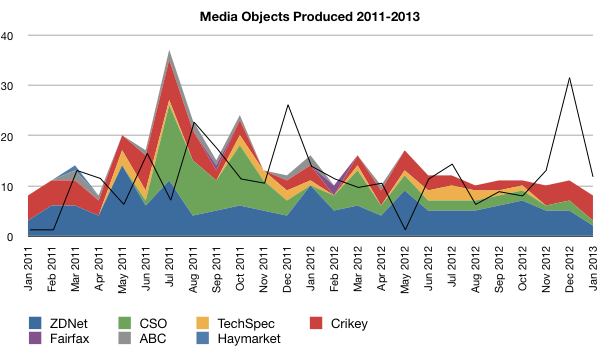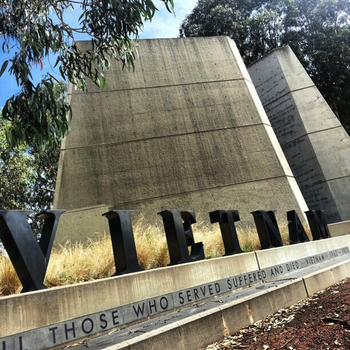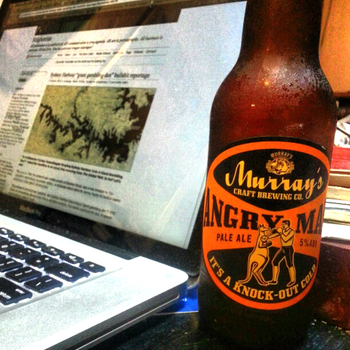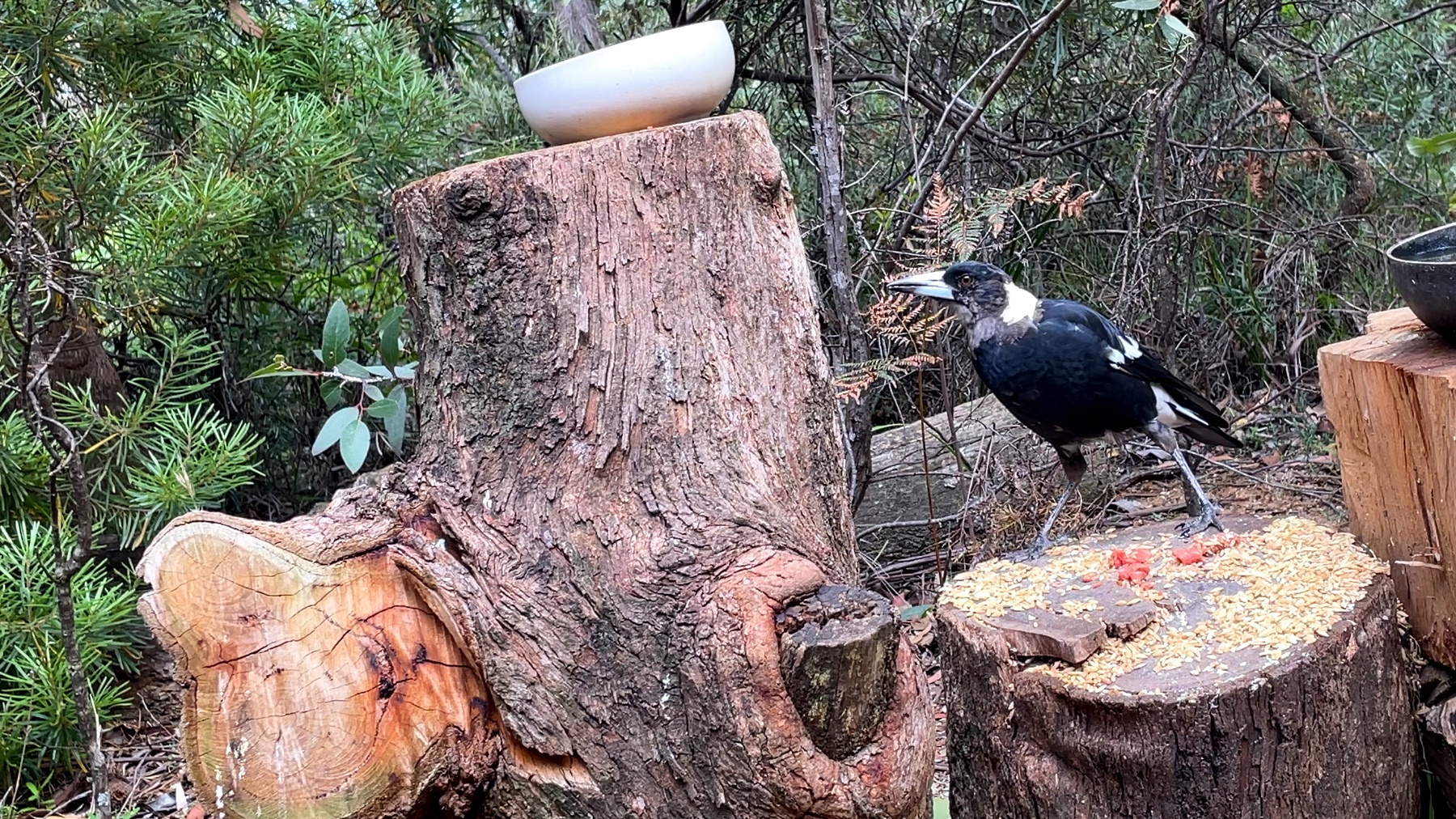My week of Monday 18 to Sunday 24 January 2021 finally started seeing me gear up for the working year with a video stream, a solid article, and more. I even snuck in a conference and experienced a great big rainstorm on Sunday afternoon.
Continue reading “Weekly Wrap 556: Magpies, writing, and some geekery”Linux.conf.au coverage trimmed: January a writing write-off
So my January was a bit of a failure. I didn’t do much reassessment of the journalism and other writing I do. The cancellation of the Patch Monday podcast and my Linux.conf.au coverage killed off income. And I spent too much money. Sigh.
If you’re not interested in my personal thought processes, skip this post. I know I would.
Linux.conf.au first. While I did think about ways to generate funding for coverage at the same level as last year, the time was too short. If I got to Canberra somehow, I could still pitch stories to editors as usual, but cashflows were tight. Then Pia Waugh invited me to interview Sir Tim Berners-Lee for iiNet as part of their sponsorship of the TBL Down Under Tour. Two nights accommodation were offered. So hey, I went to Canberra for a couple days.
I ended up filing just one story. Instead of a solid income-generating week to counteract the December-January slump, it was a loss-maker.
Want a picture? I’ve added January to my chart of stories written, and I’ve changed the title to “media objects” because I’ve added the Patch Monday podcast to the ZDNet total. I’ve also added a mysterious black line. The recent slump is clear.

So, the current status of my thinking-about-writing thing since my last update?
Continue reading “Linux.conf.au coverage trimmed: January a writing write-off”
Weekly Wrap 139: Canberra, Linux, alcohol and the web
 The week of Monday 28 January to Sunday 3 February 2013 started quietly, was ridiculously chaotic in the middle, and then went back to quiet at the end.
The week of Monday 28 January to Sunday 3 February 2013 started quietly, was ridiculously chaotic in the middle, and then went back to quiet at the end.
I decided to take advantage of the Australia Day holiday weekend and catch up on sleep rather that stress too much about getting to Linux.conf.au from Monday.
But I did fly to Canberra on Wednesday, eventually. More about that tomorrow. I spent Thursday and Friday at the conference. More about that tomorrow too.
On Saturday I made my first ever visit to the Australian War Memorial, taking a few photos along the way. Impressed.
Podcasts
None.
Articles
- Some of that ol’ NBN religion, ZDNet Australia, 31 January 2013.
- Apps? No root? Your device serves others: Berners-Lee, ZDNet Australia, 1 February 2013.
Media Appearances
- On Thursday I recorded a video interview with Sir Tim Berners-Lee, the man who invented the web, along with Australian internet bloke Simon Hackett and British actor, comedian and writer Robert Llewellyn. This was a project for iiNet, and the video
will appear on the website some time in the coming weekhas finally appeared. - On Friday I was interviewed by a journalist from Radio 2SER’s program on the media, The Fourth Estate, but it’s for next week’s episode so I’ll link to it then.
Corporate Largesse
Still none. Something must be very wrong in the world.
The Week Ahead
As far as I can tell, it’ll just be a plod-through week of writing, most of it spent at Wentworth Falls. After the chaos of the last two weeks, that’ll be welcome.
I’ll also return to the near-daily blog posting that I had going there for a while. Probably.
[Photo: Vietnam War Memorial, Anzac Parade, Canberra. I was particularly impressed with this memorial, especially the imagery and the wall of quotes, as well as the true colours of Australia nearby.]
[Update 25 February 2013: Added link to Sir Tim Berners-Lee interview.]
So who’s paying for me to cover Linux.conf.au 2013?
 It’s exactly one week until I’m meant to be in Canberra for Linux.conf.au 2013, but ZDNet Australia and TechRepublic don’t have the budget to send me. So who wants to pay for it?
It’s exactly one week until I’m meant to be in Canberra for Linux.conf.au 2013, but ZDNet Australia and TechRepublic don’t have the budget to send me. So who wants to pay for it?
Last year I wrote six articles and produced four daily podcasts. I don’t think it’s too immodest of me to say that they were well-received, and that I should cover this year’s event as well.
So, who’s going to cough up the dosh? I’ll need to have the air fares and accommodation covered, along with various minor expenses, and of course I’ll need to be paid as well. Much as I support and respect the free and open source software (FOSS) community, this media stuff is what I do to pay my bills.
I reckon there’s three ways we can do this.
- Another media company pays me to cover the event as a freelancer in the traditional way.
- I cover the event independently. I could perhaps create the Corrupted Nerds masthead for this (I wrote about that on Friday), though that seems better as the title for a security-related thing. I’d need to arrange advertisers and sponsors in the usual way, and time is short.
- I cover the event independently, but crowdsource the funding through Pozible or someone. This is supposed to be the future, so perhaps we could try it?
How much are we looking at? About $5000.
A flight from Sydney to Canberra on Sunday and back a few days after the conference ends — because I need to finish making media objects first, then fly, and if I’m in Canberra I’d do some other things while I was there (about $240). Transport to and from the airports (about $150) and to and from the conference venues ($250). Accommodation for the duration of the conference, ‘cos I’d cover the rest out of my own budget (between $1100 and $1400). Call it $2000.
As for what I’m paid, well, that’s flexible. Last year the podcasts and articles came to just under $3000 including GST. While that may sound relative high for one week of work, bear in mind that I was up at 5am and working until after midnight most days, and working into the weekend. I think I pulled an all-nighter in there somewhere. So you’re pretty much rooted for days afterwards. And freelancers provide their own equipment, and in theory things like paying for future holidays (what?), insurance (come again?) and so on.
Obviously we’d have to decide the exact format of the media objects — whether they’re written stories or live blogs or podcasts or photographs or whatever, or of course a mix thereof. The conference organisers will presumably post the raw recordings of the presentations, but the journalistic approach is to seek out the newsworthy stuff, to analyse and comment upon whats being presented and how it’s being received.
So all up, it’s about $5000. My task for Monday morning is to decide which method to focus on. Which do you think might be best?
Five questions and no answers about my media work
 As my first full working week for 2013 draws to a close, almost, here’s an update on how I’m thinking this year might unfold for me. At least as far as work goes.
As my first full working week for 2013 draws to a close, almost, here’s an update on how I’m thinking this year might unfold for me. At least as far as work goes.
(If you’re not up to speed on this, please read Doing the business on Stilgherrian’s journalism and Death of a Freedom Fighter, a writing challenge before continuing. The second one includes an explanation of my focus on how the internet is changing power relationships.)
First, there’s a tidy-up of my arrangements with mastheads I currently write for. That’s already delivered two changes. Crikey has given me a pay rise, to a level they now describe as “slightly less pathetic”. I’ve started pitching more stories, and that’s resulted in three stories this week. And there’s this as-yet unnamed sky-shouting column in the works, which will start soon.
Second, I’m thinking of doing a few self-funded projects — or at least projects for which I directly arrange funding — rather than through someone else’s masthead. There’s all sorts of ideas rolling around in my head, though I haven’t reached any firm conclusions yet.
Continue reading “Five questions and no answers about my media work”
ASIO’s got it easy, says terrorism expert
 “ASIO don’t seem to realise how privileged they are compared to intel orgs in other Western democracies,” tweeted terrorism researcher Andrew Zammit (pictured) yesterday.
“ASIO don’t seem to realise how privileged they are compared to intel orgs in other Western democracies,” tweeted terrorism researcher Andrew Zammit (pictured) yesterday.
Zammit is a researcher at the Global Terrorism Research Centre (Monash University) and Australian Policy Online (Swinburne University), and he was responding to my blog post from yesterday, “Insulted, ASIO? That’s not really the problem, surely?” and the attached podcast.
Here are his subsequent tweets, turned into continuous prose:
CIA for example has ongoing congressional oversight (of actual operations) as opposed to our occasional parl[iamentary] inquiries, people can FOI CIA docs only a few years old (ASIO has 20-30 year exemption) and some of the CIA’s analytical roles are transparent, as in analysts will have CIA business cards whereas even an ASIO kitchen hand’s identity will be kept secret. And CIA isn’t even a domestically-focused agency. So yes, ASIO needs to be less precious about being asked questions.
I agree. From the perspective of the United States I’m a foreign national, yet I’ve spoken with officers from the FBI, NSA and the Secret Service — all of whom had business cards with their full names. The closest I’ve gotten in Australia is chatting briefly with a DSD chap, one of two attending Linux.conf.au in January this year — given names only, and I suspect that those given names were really in scare quotes.
The excuse always given is “operational security”, but I do think the world has changed. The tools and methods are surely not so different from SEKRIT agencies to private-sector security companies and even analysis in non-security realms, given that so much technology is now available off the shelf to all comers.
Surely these days OPSEC is more about protecting sources and the specific operations that are or are not being conducted?
Of course I really don’t know this stuff. I’ve never worked in this field. I’ve never even held a security clearance. I’m just an interested bystander mouthing off. But I am intrigued.

